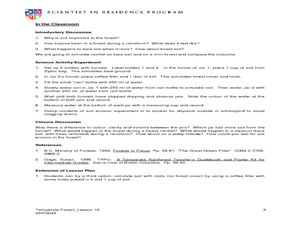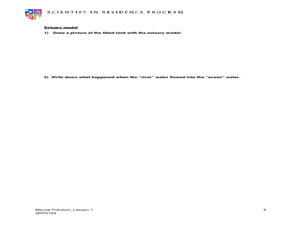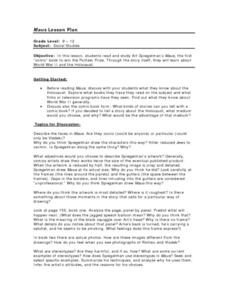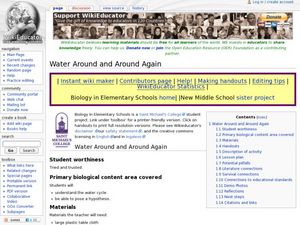Curated OER
Plant Pollination
Students investigate methods of pollination for various flowers. In this plant biology lesson, students learn the parts of a flower and form a hypothesis about the method of pollination for the flower. They determine the validity of...
Curated OER
How Do You Measure Up
Students investigate the concept of heart rate and how it is effected by environmental stresses like exercise. They conduct research readings and evaluate the data to form a hypothesis to initiate class discussion about the information.
Curated OER
Is the Hudson River Too Salty to Drink?
Learners explore reasons for varied salinity in bodies of water. In this geographical inquiry lesson, students use a variety of visual and written information including maps, data tables, and graphs, to form a hypothesis as to why the...
Curated OER
Forest as a Filter
Students experiment using soil and water. In this forest as a filter lesson plan, students identify the role of forest cover, vegetation, and foliage impacts erosion and evaporation. Students conduct a simple experiment, form a...
Curated OER
Modeling Estuaries
Students create a model estuary. In this modeling estuaries lesson, students identify characteristics and mix water of varying densities. Students form a hypothesis, conduct an experiment, and analyze the results.
Curated OER
Eggs'ceptional Experiments
Students see evidence of chemical reaction and follow the scientific method to hypothesize, observe, and reach conclusions. They conduct a series of egg based experiments such as forming crystals and complete journal activities as a...
Curated OER
Maus Lesson Plan
The artistic choices Art Spiegelman made in his graphic novel, Maus, are the focus of an exercise that asks class members to compare classic comic book forms with Spiegelman’s panels and frames. Directed to specific pages and guided by a...
Curated OER
United States Entry into World War I: A Documentary Chronology of World War I
High schoolers identify several important events that led to U.S. involvement in World War I. They examine different explanations, form an opinion about the evidence for each rationale and then create a slideshow to present their findings.
Curated OER
What is the Nature of Science?
Conduct a survey about the nature of science with your high schoolers. They will record their responses in a table and then discuss the implications of scientific theory. Note: There are activity sheets, and forms included with this...
Curated OER
Past Imperfect: Examining Secondary Sources of the American Revolution
Ninth graders respond in essay form to the following writing prompt. Mel Gibson, star of The Patriot, is quoted as stating, "If one were to adhere to historical accuracy all the way, you'd probably have the most boring two hours on...
Curated OER
What's Your Favorite Color?
Middle schoolers investigate the psychology behind color choices using two sites on the Internet. They complete a worksheet and construct an Inspiration file with the data from the charts. Then they form a hypothesis and test it using...
NOAA
Animals of the Fire Ice
When the sun's rays can't reach the producers in a food web, where does all the energy come from? Extreme environments call for extreme food sources. Young scientists investigate creatures that appear to get their energy from methane...
Curated OER
Living Fossils
Middle schoolers study the term living fossil and examine why some of the reasons they survived. In this fossils lesson students form a hypothesis and use data to see if it is accurate.
Curated OER
Project Geode
Learners predict the appearance of a geode's internal structure based on its mass and density. They form a hypothesis based on the data they collect. They also identify common minerals found in Illinois.
Curated OER
Condiment Diver: The World's Simplest Cartesian Diver
Young scholars examine buoyancy. In this density lesson students form a hypothesis, collect data and draw a conclusion using the data.
Curated OER
Understanding Climate Change
The young scientists in your class will appreciate a resource about different elements of climate change. The packet includes factual materials, informational text, and clear visuals, perfect for sharing with your environmental science...
Curated OER
Water Around and Around Again
Learners form a hypothesis for a water cycle experiment. For this water cycle lesson, students create their own environment with water and earth to study the water cycle. Learners complete a handout to make a hypothesis and prediction of...
Curated OER
Forming a Scientific Investigation
In this scientific investigation worksheet, students conduct scientific investigations on what happens to the speed of a marble when the height of a ramp is changed, what happens when you add salt to water, and 3 other experiments....
Curated OER
The Scientific Method
In this scientific method worksheet, students read over the basic steps of the scientific method and then apply those steps to a specific example. This worksheet has 8 short answer questions.
Curated OER
Beans and Birds: A Natural Selection Simulation
Students solve the following problem concerning the evolution of seed color in pinto bean plants: "How does natural selection change the frequency of genes or traits over many generations?" They use the constructivist approach to...
Curated OER
The Human Organism
In this digestion and nutrition lesson, 3rd graders test foods to find their vitamin content. Students test for starch and fats then compare their findings on charts and oral reports. The lesson concludes with a teacher directed class...
Curated OER
Rubber Band Science
In this physical limits instructional activity, students test the limits of a rubber band. Students will use various masses to test how far a 1/4 in. rubber band will stretch. They will record and graph their data, then evaluate how the...
Curated OER
Fortune Teller Fish
Middle schoolers demonstrate how to create and test a hypothesis. They design an experiment and set up a variable, experimental group and control group.
Curated OER
How Do The Colors of Light Mix?
Students investigate the mixing of light. They form a hypotheses to reason why color changes occur and they write conclusions and ask new questions arising from the investigation. Students identify the primary and complementary colors of...

























